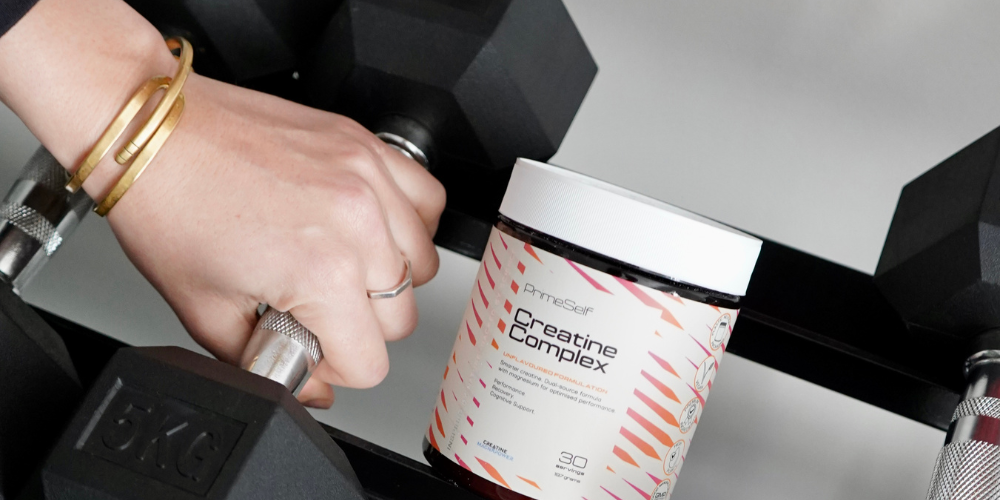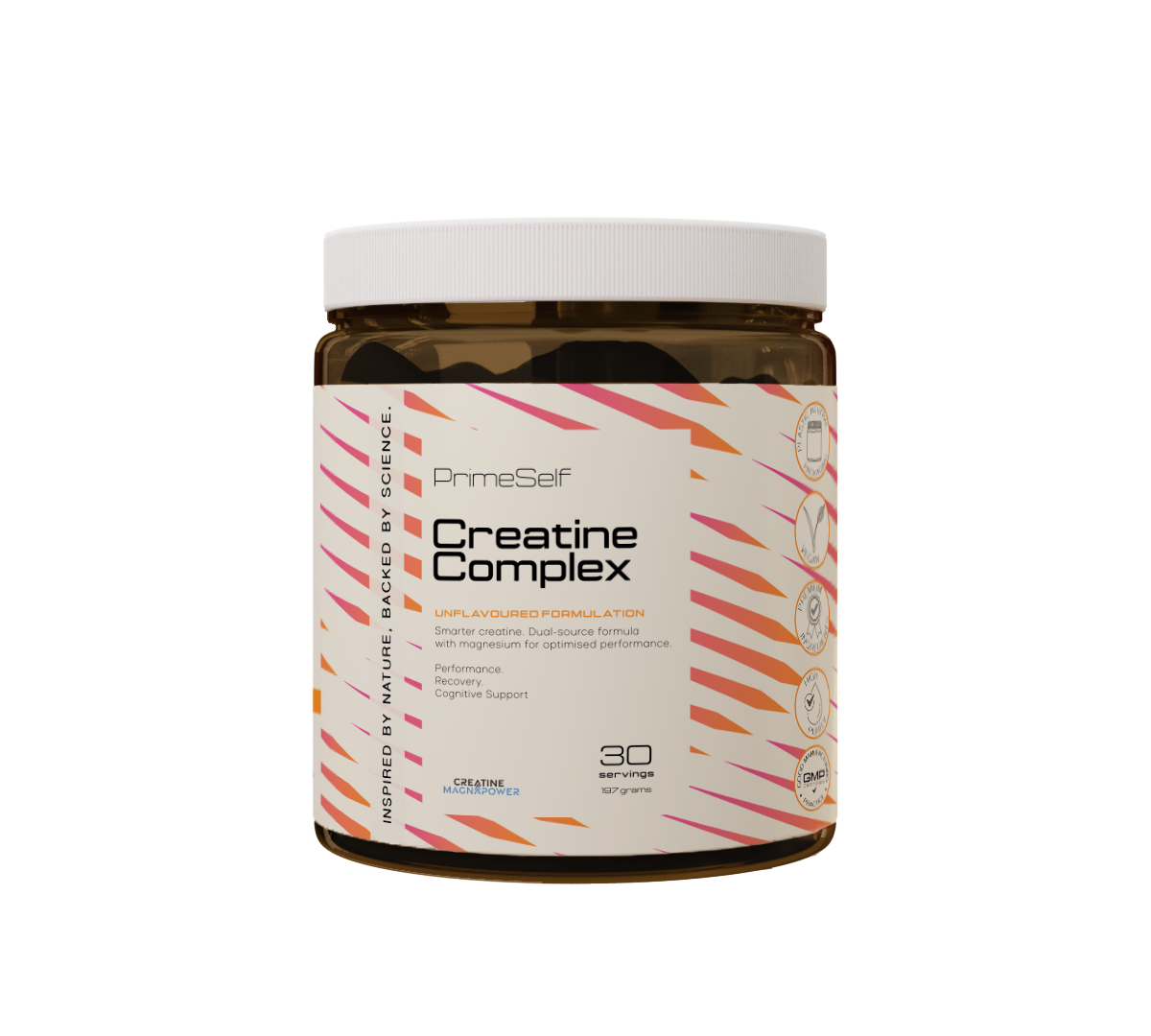
Creatine for Women: The Secret to Strength, Brain Power, and Balance at Every Age
Why Creatine Matters for Women
For years, creatine has been boxed in the “gym bro” category, sitting on the same shelf as bulking shakes and pre-workouts. But the truth is, this small yet powerful molecule does a lot more than just fuel big lifts. Research shows that creatine plays a crucial role in women’s health, supporting energy, brain function, and overall balance across every stage of life.
Women naturally have lower creatine stores than men, approximately 70-80% less. This is partly because of smaller muscle mass, but also because many women eat less creatine-rich food, like red meat or fish. Our bodies naturally produce about 2 to 3 grams of creatine each day, but that is not enough to keep up with what we use. Combine that with hormonal changes that affect how we produce and use energy, and it becomes clear why creatine can make such a powerful difference for women.
Simply put, creatine helps close that energy gap so you can perform, think, and feel your best every day.
What Is Creatine and Why Should You Care?
Creatine is a compound made from three amino acids: glycine, arginine, and methionine. It helps your body recycle ATP, the molecule that provides quick energy to your cells. More ATP means more energy for your muscles, brain, and metabolism.
In simple terms, creatine acts like your body’s portable charger. It helps your muscles contract efficiently, supports brain focus and memory, and even benefits your gut and heart function.
It’s naturally found in your body and in certain foods, but supplementation gives you a steady supply that keeps your energy systems running smoothly.
Now that we have covered the basics, let’s get into the good stuff on how creatine can support women through each phase of life.
Creatine Through the Life Stages of Women
Menstruation and Reproductive Years
If you are in your 20s or 30s, creatine can be your quiet edge, the kind of support that works in the background to help you feel strong, focused, and balanced. Hormonal shifts throughout the menstrual cycle can influence everything from how you feel to how your body performs. Oestrogen and progesterone affect fluid balance, energy metabolism, and even brain chemistry, which is why some days you feel unstoppable and others you feel flat, foggy, or fatigued.
Creatine helps buffer those ups and downs by supporting your body’s energy systems. Research suggests it can help stabilise energy, enhance muscle recovery, and improve mental focus throughout the month. It also plays a role in hydration by drawing water into muscle cells, which can help reduce that heavy, bloated feeling that often arrives during the luteal phase.
Studies on active women show that creatine can boost strength and endurance during exercise while also supporting focus and mental clarity when fatigue sets in. It benefits both body and mind, making it especially valuable for women who train regularly, work long hours, or lead busy, demanding lives.
The result is fewer energy crashes, better recovery, more consistent training sessions, and sharper mental clarity all month long. Think of it as a little extra resilience for both your muscles and your mind.
Pregnancy and Postpartum
Creatine’s role during pregnancy is an exciting area of research, though still in its early stages. What we know so far is that creatine plays a central part in energy production and oxygen regulation, two processes that are especially important during pregnancy, labour, and recovery.
Animal and early human studies suggest that creatine may support maternal energy levels and help protect the baby during times of stress, such as labour, by improving how cells handle oxygen and energy demand. Some evidence also shows that creatine levels in breast milk are highest immediately after birth, which hints that the body naturally prioritises creatine during this critical phase of life.
While researchers are exploring whether creatine should be considered a conditionally essential nutrient during pregnancy, it is important to note that human studies are still limited. So while the science is promising, it is best to take a cautious approach.
If you are pregnant or breastfeeding, always consult your healthcare provider before supplementing. Once cleared, creatine may become part of your postnatal recovery toolkit, supporting energy, mood, and resilience during one of the most demanding times in a woman’s life.
Perimenopause
Perimenopause marks the gradual shift toward menopause, typically starting in your 40s. It is a time when oestrogen levels begin to fluctuate, bringing changes in mood, energy, strength, and mental clarity. This is where creatine really earns its place in your daily routine.
Research suggests that creatine supplementation can help preserve lean muscle, and support cognitive function during this transitional phase. As hormones change, muscle recovery and energy metabolism can slow down, which often leaves women feeling tired or less motivated to move. Creatine helps counter that by improving how your muscles and brain store and use energy.
There is also growing evidence that creatine may support mental wellbeing. Studies indicate that creatine may help ease feelings of fatigue, anxiety, or low mood. By supporting brain energy metabolism, it gives you a more stable sense of mental clarity and focus.
Many women describe creatine as something that helps them feel like themselves again - stronger, more grounded, and more capable of handling life’s daily demands. When paired with resistance training, the benefits multiply.
Menopause and Post-Menopause
Menopause marks the end of the reproductive years, and with it comes a significant drop in oestrogen. That hormonal decline affects everything from bone and muscle health to cognition and mood. It is why many women notice a loss of strength, slower recovery, and changes in body composition during this phase.
Creatine has been shown to help address many of these challenges. Studies in postmenopausal women show that regular creatine supplementation, particularly when combined with resistance exercise, supports lean muscle mass, improves bone geometry, and enhances physical performance. It is also linked to improvements in fatigue resistance and cognitive function, helping you stay energised and mentally sharp - say goodbye to the brain fog.
Think of creatine here not as a performance booster, but as a preservation tool that helps maintain vitality, confidence, and independence. It is about feeling strong enough to keep doing the things you love, from your workouts to your hobbies to playing with the grandkids, without losing momentum.
Later Life and Healthy Ageing
As the years go on, maintaining muscle, mobility, and mental clarity becomes a key part of staying healthy and independent. Creatine continues to prove its worth in this stage of life, offering benefits that go well beyond fitness.
Research shows that creatine supplementation in older adults helps preserve muscle strength, balance, and reaction time, all of which reduce the risk of falls and frailty. It also supports cognitive function by improving energy production in the brain, helping you stay sharp and engaged.
Creatine pairs beautifully with regular movement, good nutrition, and quality sleep to form the foundation of healthy ageing. It is not just about adding years to your life, but about adding energy and strength to those years.
For women entering this stage, creatine is a small daily habit that delivers long-term rewards such as resilience, energy, and the strength to stay active and capable for the years to come.
How Much Creatine Do Women Need?
The best part about creatine is how easy it is to use.
- Daily dose: 3 to 5 grams per day
- Optional loading: 10 grams per day (split over 2 doses) for 5 to 7 days, then drop to 3 to 5 grams per day
- Timing: Any time of day, what matters most is consistency
- Hydration: Drink plenty of water. Creatine draws water into your muscle cells to support energy and recovery, not under your skin, so it will not cause bloating.
- Results: Expect about three weeks before your body is fully saturated and you start to feel the benefits
Creatine works best alongside strength or resistance training, but even without exercise, it can still help with focus and energy.
And to clear up a common myth: creatine will not make you bulky. It increases water inside muscle cells, making your muscles look more toned and defined, not puffy.
The PrimeSelf Edge
When it comes to creatine, not all formulas are created equal. Most products stop at the basics, but we wanted to create something that goes beyond “standard”.
PrimeSelf Creatine Complex combines two of the most effective, research-backed forms of creatine to deliver next-level performance and recovery benefits:
- Creatine Monohydrate: The gold standard, backed by decades of clinical research.
- MagnaPower Creatine Magnesium Chelate: A next-generation form that supports better absorption and enhanced energy production.
Here’s what makes it different:
-
Dual-Action Synergy
Our formula pairs pure Creatine Monohydrate, the gold-standard form proven by decades of research, with MagnaPower®, a patented form that bonds creatine with elemental magnesium. This unique combination enhances how creatine is absorbed and used by the body. The result? Better uptake, smoother digestion, and faster results you can actually feel.
-
The Magnesium Advantage
Magnesium is one of the most important minerals for human health, helping with energy production, recovery, and muscle contraction. By binding magnesium to creatine, we improve bioavailability and support over 300 energy-dependent reactions in the body. It’s like upgrading creatine’s operating system by giving your muscles, brain, and cells an even more efficient source of energy.
-
More Than Muscle
While traditional creatine supports strength and power, PrimeSelf’s formula goes further. It’s designed to support focus, cognitive performance, recovery, and overall vitality, helping you feel sharper in the mind and stronger in the body both in and out of the gym.
-
Clean and Effective
No fillers, no gimmicks. Just a premium blend built for results you can trust. Every serving delivers clinical-grade creatine, enhanced with magnesium for optimal absorption, so nothing goes to waste.
The result:
A smarter, cleaner, and more complete creatine. One that works as hard as you do and supports your strength, energy, and brain health from the inside out.
The Bottom Line
Creatine is one of the most researched supplements in the world, and its potential for women is only getting clearer. It supports muscle tone, cognition, recovery, and mood through every phase of life.
While more research is needed in areas like pregnancy, the overall evidence is strong and reassuring. For most women, creatine is a simple, safe, and powerful way to support both physical and mental wellbeing.
You deserve to feel your best, energised, strong, and balanced. Creatine might just be the missing piece in helping you get there.
Ready to feel your PrimeSelf?
Try PrimeSelf Creatine, featuring the perfect balance of Creatine Monohydrate and MagnaPower Creatine Magnesium Chelate. Designed for women who want to stay strong, focused, and full of life at every age and stage.







